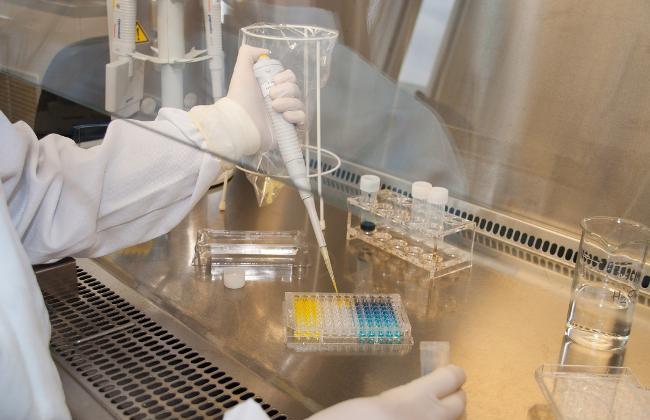Scientists from the Paul-Ehrlich-Institut Win the Rhineland-Palatinate Research Prize
- Researchers from the Paul-Ehrlich-Institut have been awarded the "Research Prize of the State of Rhineland-Palatinate for the Promotion of Research into Alternative and Complementary Methods for Animal Testing in Scientific Research and Teaching". A public award ceremony was not held due to the COVID-19 pandemic.
- The prize winners proved that in the manufacture of tetanus vaccines it was possible to dispense with the "test for irreversibility of tetanus toxoids", which previously had to be carried out as part of safety testing.
- The scientists’ work led to the test being removed from the European Pharmacopoeia. Since the beginning of 2021, all European vaccine manufacturers have been able to dispense with this animal test on guinea pigs.
"The fact that the COVID-19 pandemic prevented an in person presentation of the prize does not detract from the importance of the work that is being recognised by the Research Prize. This work will act as a motivation for other similar projects in the future. The research and development of medicines has long played a major role in Rhineland-Palatinate, not just since the advent of COVID-19. Against this background, it is our stated goal to reduce animal testing. The work of Dr Krämer and Dr Behrensdorf-Nicol has thus made an enormous contribution to animal welfare. I wish the prize winners all the best both personally and in their future work and I am sure that they will continue to conduct courageous and ground-breaking research that is capable of bringing about a change in actions and awareness,"
stated Katrin Eder, Minister for Climate Protection, Environment, Energy and Mobility of the State of Rhineland-Palatinate.
"With the award of the Research Prize of the State of Rhineland-Palatinate for Research into Alternative and Complementary Methods for Animal Testing, I am delighted that this area of research at the Paul-Ehrlich-Institut is once again being honoured and that the great commitment of our scientists to the removal of outdated animal tests from the European Pharmacopoeia is being recognised,"
added Professor Klaus Cichutek, President of the Paul-Ehrlich-Institut.

Press Release
Dr Beate Krämer and Dr Heike Behrensdorf-Nicol, scientists from the Veterinary Medicine division at the Paul-Ehrlich-Institut, have won the Rhineland-Palatinate Research Prize for their research into the "Relevance of the Test for Irreversibility of Tetanus Toxoids". Their research work, in collaboration with other colleagues from the Paul-Ehrlich-Institut, has led to previously mandatory animal tests being deleted from the European Pharmacopoeia. The prize is worth 20,000 euros. The state of Rhineland-Palatinate has been awarding the prize since 2008.
In the manufacture of tetanus vaccines, an innocuous toxoid is produced from the toxin of the bacterium Clostridium tetani by means of chemical inactivation. This toxoid is administered as the antigen of the vaccine and triggers the protective immune response. It must be ensured that no active neurotoxic tetanus toxin is present in the vaccine. A batch of vaccine in which a neurotoxin could still be detected would be regarded as unsafe. For this reason, the European Pharmacopoeia stipulates that in the manufacture of the vaccine each batch of tetanus toxoid must be tested for safety on guinea pigs.
Until 2020, a test for the irreversibility of the toxoid was prescribed: in order to confirm that the inactivated material does not regain its toxicity even during longer periods of storage, the toxoid had to be tested on animals after six weeks of storage at 37°C. In parallel, toxoids stored at 5°C were tested as a control. In total, ten guinea pigs were required for the confirmation of irreversibility for each batch of toxoid manufactured.
Research Result: Test for Irreversibility Dispensable
The prize winners examined the question of whether the previously assumed risk of the reversion of tetanus toxoids, i.e. the risk that toxicity could be regained, still exists in the manufacture of tetanus vaccines using modern, validated production processes. Extensive scientific research supported their theory that a reversion of tetanus toxoids during vaccine manufacture does not represent a real danger. The researchers also proved through their own experimental investigations using an in vitro assay developed at the Paul-Ehrlich-Institut that the irreversibility test in its previously prescribed form does not supply meaningful results.
Animal Test for Irreversibility for Tetanus Toxoids Removed without Replacement
The scientists presented their results to the expert groups of the European Pharmacopoeia Commission, which decide on mandatory tests. The scientific discussion by the experts regarding the relevance of the irreversibility test for tetanus toxoids ultimately led to this test being removed, without replacement, from the Pharmacopoeia regulations for human and veterinary vaccines. The new regulations came into force at the start of 2021, so since then all European vaccine manufacturers have been able to dispense with this animal test.
The Paul-Ehrlich-Institut has been committed to the development of alternatives to animal testing for several decades now and has received multiple awards in this area.
Behrensdorf-Nicol HA, Krämer B (2019): Is the test for irreversibility of tetanus toxoids still relevant?.
Vaccine 37: 1721-1724.
Online-Abstract
top



